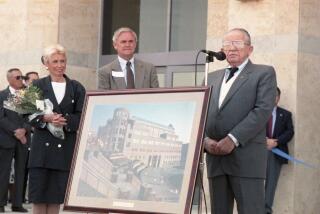Dean Told to Apologize for Releasing Letter
- Share via
HELENA, Mont. — A University of Montana dean has been directed to apologize for releasing a letter from a media foundation that said it would not give money for a new journalism building until Montana attitudes about nonresident landowners improved.
University President George M. Dennison confirmed that he had instructed Journalism Dean Jerry Brown to apologize to James C. Kennedy, chairman of the Atlanta-based media company Cox Enterprises Inc. and vice president of the James M. Cox Jr. Foundation.
Brown declined to comment.
But in copies of an e-mail made available by another source and reviewed by the Associated Press, Brown wrote: “At the president’s direction, I am going to apologize to Kennedy, though his lawyer called me first to apologize for Kennedy’s broadside.”
However, lawyer Lance Lovell of Billings said Kennedy “did not broadside the school and the dean knows that I did not call to apologize for a broadside.”
The e-mail was addressed to Deborah McWhinney, a fundraising chairwoman for the University of Montana Foundation. Projects for which it has sought money include a new journalism building. Dennison told Brown to apologize after the dean gave the Associated Press a copy of the letter in which the Cox foundation snubbed a request for money to build an auditorium in the $11-million journalism building.
The auditorium is now on hold for lack of money.
The letter touched on a sensitive topic in Montana.
For years, some residents have complained that rich people looking for a new lifestyle move to the state, only to question Montana’s way of doing things, particularly access to hunting and fishing.
“Many Montana residents are making it known that they are not happy with nonresident landowners in their state,” the Cox foundation letter said.
“In addition, stream and river access issues are also being raised. Until these issues are resolved and our presence in the state is more appreciated, we have decided not to make any further contributions in Montana.”
The letter was signed by a secretary but expressed the views of Kennedy, whose property in Montana includes land along the Ruby River, a prized trout stream where public access to the water is controversial.
Kennedy later said a donation to the university was denied chiefly because Cox does not have businesses in the state.
In an e-mail under the heading “Damage Control,” McWhinney criticized Brown for releasing the letter and wrote, “Now how do we win friends? Hopefully you have a lot of ideas how we can make amends and fill the gap you have created.”
McWhinney was not available to return a call seeking comment, said a spokeswoman at her office in San Francisco.
The criticism of Brown brought broadcast journalist Don Oliver, a Montana graduate and president of a School of Journalism advisory board, to the dean’s defense.
A dean of journalism has many functions, the most important being to champion “the highest journalistic practices” and serve as a role model for students, Oliver wrote McWhinney.
By releasing the letter, Brown served the public’s right to know, said Oliver, who worked in radio and television news for more than three decades, mostly for NBC.
“As the head of a journalistic enterprise it is inconceivable [Kennedy] believed the comments would not be disseminated for public appraisal,” Oliver wrote.
“He made no reference in the letter to anything being treated as confidential.”
But Dennison said the letter from Kennedy was never intended to be public and its disclosure was “an unfortunate thing.”
More to Read
Sign up for Essential California
The most important California stories and recommendations in your inbox every morning.
You may occasionally receive promotional content from the Los Angeles Times.












